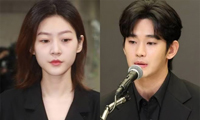Staff Reporter
SEOUL-The movie "Friend" has become a phenomenon. It premiered on March 3l and swiftly became the most popular Korean film ever. "Friend" is expected to reach 7.5 million tickets sold by the end of this month, meaning that every other adult between l8 and 35 will have seen it.
Signs of the movie’s success can be seen everywhere, from the popularity of the distinctive Pusan dialect, where the movie takes place, to phrases like "Aren’t we friends" or "Friends don’t have things to be sorry about," which apparently left a strong impression on the audience. In short, the movie is creating a fad of its own.
And also debate. Perhaps no other film has received such harsh criticism and raves at the same time. It’s not the same old critic-audience disparity, which leaves the viewers wondering why the renowned critic slashed the Spielberg that they loved so much.
Go over to any Internet bulletin board or alternative media sit these days and one is bound to see discussions on the movie; there are only two creeds, friends and foes of "Friend." Here, the very elements that have made the film a success seem to be the same ones that some deplore the most.
So what is behind the movie’s huge success? And for the stubborn few that still haven’t seen the movie, what is "Friend" about, anyway?
Late l970s, in the port city of Pusan. Three boys who swam along the beaches and played pranks together meet in high school. There’s the fantastic-looking Dong-su, (played by Chang Dong-kon) a regular bad turn, who has some reservations about his best friend Chun-sok (Yu-O-song), who happens to be the best fighter in the whole school.
Then, there’s the third friend and narrator of the story, the good student Sang-taek, who despite briefly flirting with the wild life with his two buddies, ends up going to university and leading a normal life. Dong-su and Chun-sok lead lives of gangsters after dropping out of school, due partly to a fight caused in an attempt to protect Sang-taek.
"Friends don’t have anything to be sorry about," the famous line, is spoken in the scene in which Chun-sok refuses Sang-taek’s offer to run away from home, just after he was kicked out of school.
Throughout the years, the threesome preserve their friendship despite the contrasting lives they lead. They support each other through good and bad, until a tragic twist of fate and misunderstandings leads Chun-sok to kill Dong-su.
Despite the tragic end, the message of the movie seems clear: that such a friendship which has undergone the test of time is the most noble thing of all.
"It made me think, after a long time, of what friendship really means," wrote Kim Jin-suk on the Internet homepage of the movie. Hundreds of similar articles appeared there.
Without doubt, the movie has struck a chord with a large number of people who were eager to receive such a message. The film’s biggest fans are males in their 30s and older, those who are not the typical moviegoer and who had been thirsty for movies that were not meant for twenty-somethings out on a date.
After watching too many tear-jerking movies that often lacked a touch of reality and portrayed middle-class characters living in a fantasyland, many men apparently raved over "Friend," in which more down-to-earth figures spin out a distinctively male story.
"The director (Kwak Kyong-taek) knows what men think, and I am ready to believe him when he said that the film was based on a true experience with his friends," said a netizen who hails from the Pusan area.
The movie’s sensitive depiction of the late ‘70s and early ‘80s also triggered much emotion among the audience. Some remarkable details, such as children running after cars that are spraying pesticides, or teens hanging out in the rollerskating rinks that were a popular venue for dates at the time, are good examples.
It must also be remembered that the ongoing retro fever in Korea helped fuel the movie’s success. From commercials to catwalks, modern Korea is obsessed with its past, and the movie’s very creation was made possible because of this atmospere.
The result? That the film’s audience was reminded of the "good old days," longing for the days when there existed a pure friendship, one that transcended all interests, and something one didn’t need an explanation.
Such an emphasis on protective and unconditional friendship is precisely what critics of the movie base their arguments on. A movie may just be a movie, but the active voices that are at work on Internet sites do not hide their dipleasure at the film’s phenomenal success.
In fact, the movie shows precisely the problems Korea must deal with before going further into the 2lst century, they argue.
First of all, foes of "Friend" criticize the distorted picture of friendship the movie gives to the audience. While there may be some beauty to the unselfishness of the characters in dedicating themselves to their friends, they see little merit in a friendship in which you can even kill for your friend
"I found the emphasis on friendship disturbing; their rule is such that while for friends, no questions will be asked, there is no mercy for outsiders. How similar to our society, where among friends, too much is tolerated," remarked Lee Hyun-jin, a student, after seeing the movie.
Just as Lee said, Korea is basically a country of friends, with everyone from your elementary school buddies to army comrades valuabe assets that can, if you have the chance, bail you out of almost everything, given that they are in the right position.
Regionalism, which is synonymous with the ills of Korea politics, is another kind of friendship that went wrong. Such blind adherence to a group based on region, with litttle regard to the actual beliefs a person might have, has all brought about the catastrophic results that we see in society today.
"That the politicians liked the film is no wonder, since they are the ones used to doing everything for their cronies, and always emphasize the ‘pecking order’ so important in the world of gangs (portrayed in the film)," said Jidun on the Internet. President Kim Dae-jung as well as opposition leader Lee Hoi-chang have both seen the movie. Whereas the former said that the excessive violence in the movie points to people’s frustration with life, the latter jokingly made the remark "Aren’t we friends?" in dialect, of course.
Such a remark might not be all a joke, because Lee hails from the very Kyongsan province where the movie took place, and he more or less takes it for granted that people from the area will support him if he runs as the opposition party candidate in the next presidential race.
The movie’s portrayal of women is another issue that many viewers found disturbing. On top of all the violence and the masochistic bent the movie contains, many viewers asked when, if ever, Korean cinema will break free from the overused metaphor of sexual abuse for virtually everything.
For instance, one of the main incidents that define the movie’s destiny is when Chun-sok invites Sang-taek to "share" his girlfriends. Jin-suk, just about the only notable female figure in the movie, later reappears in the movie as Chun-sok’s wife. When Chun-sok suffers from a drug addiction, the other buddies visit him, and in front of them all Chun-sok openly insults his wife sexually. There is nothing the friends can do, and later on in the movie he simply disappears from the story line.
"The degradation of women is justified because of friendship," said Yu Gina of Dongguk University, a feminist film critic.
"The charismatic image of Yu O-song (who played Dong-su) covers all other ethical faults," she pointed out, warning against the belated revival of a male fantasy, under which category she puts other recent Korean movies such as "Failan" or "The Humanist."
And what did the director, Kwak Kyong-taek say about all the controversy surrounding his megahit? Basically, he said that the violent scenes are not an end to themselves, and should be understood as a cinematic device.
"It’s a film to be seen with the heart, not with the head," Kwak said in a recent magazine interview.
Asked whether his portrayal of the past did not take away the pains of growing up and focused only on the good parts, he answered that it is the tendency of the general public to remember only the beautiful memories of the old days, and also admitted that the last parts of the film were roughly edited.
Thus the regressive quality of the movie seems obvious. It’s a careful step aimed to bask in the memories of the past, selectively ignoring parts one would rather not remember.
From time to time, we all feel the urge to go back to the old days, to rummage through old memories of a bygone era. For those living in the present, which keeps pushing us forward and moving on without looking back, resisting this pressure is itself a small rebellion that almost everyone can afford.
"With the exception of a few, most people unable to improve their wearisome life by themselves try to find some solace in the hazy memories of the past," concedes professor Kang Nae-hee of Chung Ang University, with regard to the popularity of "Friend" and the retro fever that hit Korea last year.
The problem is, no matter how cozy recollections of the past are, they never provide the answer, and can never overrule the agonies of life we are in, he says.
And speaking of the past, wasn’t it the very period when dictatorship oppressed every brethren on the peninsula? Or the Japanese colonial period when things were even worse?
Remember the U.S. movie "Pleasantville," in which the boy longs for the kind of life he sees in the television drama, dreaming of the l950s when things like teenage pregnancy, drugs and divorce were unheard of?
By some miracle, he suddenly finds himself inside the drama, and, alas, once in the society he realizes that behind the veneer of harmony and normalcy, there lurked a bigger kind of evil, the intolerance of difference.
Similarly, the glorification of the present in Korea in the year 200l also masks a past where similar evils such as discrimination against women, the prevalence of violence, both in state and on personal level, abounded.
"With neoliberalist globalization having made our lives even more difficult I dare say that the present is where we start," professor Kang says.
Vigilant with hopes for a better tomorrow, it’s time we left the theater of old friends and started making new acquaintances.
스마터리빙
more [ 건강]
[ 건강]이제 혈관 건강도 챙기자!
[현대해운]우리 눈에 보이지 않기 때문에 혈관 건강을 챙기는 것은 결코 쉽지 않은데요. 여러분은 혈관 건강을 유지하기 위해 어떤 노력을 하시나요?
 [ 건강]
[ 건강]내 몸이 건강해지는 과일궁합
 [ 라이프]
[ 라이프]벌레야 물럿거라! 천연 해충제 만들기
 [ 건강]
[ 건강]혈압 낮추는데 좋은 식품
[현대해운]혈관 건강은 주로 노화가 진행되면서 지켜야 할 문제라고 인식되어 왔습니다. 최근 생활 패턴과 식생활의 변화로 혈관의 노화 진행이 빨라지고
사람·사람들
more많이 본 기사
- 트럼프, MAGA 내부서도 식나… ‘매우 지지’ 8개월새 8%p 하락
- 유럽, 우크라 안전보장 다국적군 제안…유럽 주도하고 미국 지원
- ‘美정부가 대주주’ 인텔, 대관담당으로 트럼프 보좌관 영입
- 尹 ‘체포방해 혐의’ 내달 16일 선고…4개 재판 중 첫 결론
- “과부랑은 결혼해도 이혼녀는 절대 안 돼”…뿌리 깊게 박힌 편견, 中 차별 역사 보니
- 젤렌스키 “푸틴이 종전안 거부하면 미국에 장거리 무기 요청”
- 경찰, 김건희특검 상대 추가 압수수색…내일 한학자 접견조사
- 트럼프, ‘의회폭동 다큐’ BBC에 100억 달러 명예훼손 손배소
- 테슬라 주가 올들어 최고…사상 최고치도 연내 경신하나
- “197명 아빠 된 정자 기증자, ‘암 위험 90%’ 돌연변이 보유자였다”…10명 이미 암 진단
- ‘10명 탑승’ 항공기 멕시코서 추락… “최소 6명 사망”
- 대장동 ‘범죄수익 찾기’ 본격화…김만배·남욱, 추징해제 청구
- 우크라인 75% “확고한 안전보장 없이 러 유리 종전안 수용 불가”
- 미국, 무역합의 이행 늦다며 최우방 영국에 AI협력 일시중단
- ‘핀테크 원조’ 페이팔, 미국서 은행 설립 나서
- LA서 ‘새해벽두 폭탄테러’ 모의 일당 체포… “기업들 공격 시도”
- 마약딛고 함께 영화도 만들었는데…라이너감독 살해한 아들 체포
- 한국 3월 A매치 상대 한 팀 사실상 확정... 오스트리아 감독 ‘평가전 인정’
- 브라운대 총격사건 수사 난항 겪나…체포한 용의자 석방
- ‘15년째 활동 無’ 원빈 근황, 이시언 유튜브서 공개..”잘 지내는 중”
- [송년행사 화보] “웃음과 감사 가득 ‘훈훈’… 함께해서 행복”
- [경제 트렌드] 외식비 줄이는 소비자… ‘팁 공포’ 한몫
- “내 한국인 남편, 40일 넘게 개처… 1
- 항공기 승객정보 활용 추방 확대
- ‘최고 부자’ 머스크 자산 6천770억달러 돌파…”최초 조만장자 눈앞”
- 대기천 워싱턴주 강타 역대급 홍수 ...워싱턴주 서부 이례적인 대기천 폭우로 역대급 홍수 발생
- 美, 반중 언론인 지미 라이 석방 촉구… “표현의 자유 침묵시켜”
- 트럼프, 합성마약 펜타닐을 ‘대량살상무기’로 지정
- ‘우미노시즈쿠 후코이단’ 감사 이벤트
- 국과수 “김수현·故 김새론 녹취파일, AI 조작 판정 불가”
- ‘128개 홈디포 매장서 319건 절도’ 플러싱 기반 전문절도단 일망타진
- 통일교 등 압수수색 15시간만 종료…회계자료·휴대전화 확보
- ‘해리가 샐리를 만났을 때’ 롭 라이너 감독 부부 피살
- 오레곤문인협회 신임 회장에 김인자 시인...11일 정기총회서…김혜자 직전회장 6년간 헌신 다해
- 현대車사장, ‘구금사태’ 조지아서 “일자리 4만개 창출할것”
- 뉴욕증시, AI 회피 심리 지속…하락 마감
- 박나래 ‘링거·주사 이모’ 난리통 속 결국..MBC ‘팜유트립’ 제작 무산
- 관세가 끌어올린 물가… 가구당 1,200달러 추가 지출
- 트럼프, 합성마약 펜타닐을 ‘대량살상무기’로 지정
- 원지, ‘6평 사무실’ 논란 후 첫 방송 출연..無편집 “적응 안 돼”
- 멕시코의 최대 50% 관세 배경 설명, ‘트럼프 복사판’
- ‘지독한 플래툰’ 김혜성도 71G 뛰었는데, 美 팬그래프 ‘송성문 ML 36G 타율 0.251’ 예상
- 백화점서 아기 기저귀 갈던 엄마 40대 정신질환자에 흉기 피습
- 뉴욕 백화점서 아기 기저귀 갈던 엄마, 정신질환자에 흉기피습
- ‘베네수 코앞’ 트리니다드토바고 “미군에 공항접근 허용”
- 워싱턴 한국학교협의회, 제37회 교사의 밤
- 피로 얼룩진 주말…지구촌 곳곳 총격사건 잇달아
- 역시 호날두! 북중미 WC 인기 티켓 1위는? 포르투갈-콜롬비아전... 3위가 한국-멕시코전 “개최국 효과”
- 오늘의 베네수엘라가 내일의 동아시아국… 2
- 퇴조의 핑크 타이드
1/5지식톡

-
 ☝️해외에서도 가능한 한국어 선생님…
0
☝️해외에서도 가능한 한국어 선생님…
0이 영상 하나면 충분합니다!♥️상담신청문의♥️☝️ 문의 폭주로 '선착순 상담'만 진행합니다.☎️ : 02-6213-9094✨카카오톡ID : @GOODEDU77 (@골뱅이 꼭 붙여주셔야합니다…
-
 테슬라 자동차 시트커버 장착
0
테슬라 자동차 시트커버 장착
0테슬라 시트커버, 사놓고 아직 못 씌우셨죠?장착이 생각보다 쉽지 않습니다.20년 경력 전문가에게 맡기세요 — 깔끔하고 딱 맞게 장착해드립니다!장착비용:앞좌석: $40뒷좌석: $60앞·뒷좌석 …
-
 식당용 부탄가스
0
식당용 부탄가스
0식당용 부탄가스 홀세일 합니다 로스앤젤레스 다운타운 픽업 가능 안녕 하세요?강아지 & 고양이 모든 애완동물 / 반려동물 식품 & 모든 애완동물/반려동물 관련 제품들 전문적으로 홀세일/취급하는 회사 입니다 100% …
-
 ACSL 국제 컴퓨터 과학 대회, …
0
ACSL 국제 컴퓨터 과학 대회, …
0웹사이트 : www.eduspot.co.kr 카카오톡 상담하기 : https://pf.kakao.com/_BEQWxb블로그 : https://blog.naver.com/eduspotmain안녕하세요, 에듀스팟입니다…
-
 바디프렌드 안마의자 창고 리퍼브 세…
0
바디프렌드 안마의자 창고 리퍼브 세…
0거의 새제품급 리퍼브 안마의자 대방출 한다고 합니다!8월 23일(토)…24일(일) 단 이틀!특가 판매가Famille: $500 ~ $1,000Falcon: $1,500 ~ $2,500픽업 & 배송직접 픽업 가능LA…
케이타운 1번가
오피니언
 옥세철 논설위원
옥세철 논설위원오늘의 베네수엘라가 내일의 동아시아국가…

퇴조의 핑크 타이드
 조지 F·윌 워싱턴포스트 칼럼니스트
조지 F·윌 워싱턴포스트 칼럼니스트 [조지 F. 윌 칼럼] 대통령의 전쟁수행권
 조옥규 수필가
조옥규 수필가 투고(To Go) 해야 하나?
 신경립 / 서울경제
신경립 / 서울경제 [만화경] ‘뒷마당’ 찾겠다는 트럼프식 먼로주의

22기 LA평통 출범에 거는 기대

연말 시즌 사기·범죄 경계해야
 메건 매카들 워싱턴포스트 칼럼니스트
메건 매카들 워싱턴포스트 칼럼니스트 [메건 매카들 칼럼] 장편영화의 마지막 챕터인가
 김미선 서북미문인협회 회장시인
김미선 서북미문인협회 회장시인 [한국춘추] 하늘을 계산한 사람들, 칠정산
1/3지사별 뉴스

피로 얼룩진 주말…지구촌 곳곳 총격사건 잇달아
지난 주말 동안 미동부 아이비리그 브라운대학에서 총격 사건이 발생, 최소 2명이 사망하고 9명이 부상한데 이어 호주 시드니에서는 사망자 16…
뉴욕·뉴저지 등 19개 주정부 H-1B비자‘10만달러 수수료’소송

워싱턴 한국학교협의회, 제37회 교사의 밤
재미한국학교 워싱턴지역협의회(회장 정광미)가 13일 ‘제 37회 교사의 밤’을 개최, 한 해 동안 헌신한 교사들의 노고를 위로했다. 올해 최우…
안수화 회장 연임 확정

트럼프, 합성마약 펜타닐을 ‘대량살상무기’로 지정
도널드 트럼프 대통령은 15일 신종 합성마약으로 미국에 대량 유입된 펜타닐을 ‘대량살상무기’(WMD)로 지정했다.트럼프 대통령은 이날 백악관에…
‘우미노시즈쿠 후코이단’ 감사 이벤트

오늘 하루 이 창 열지 않음 닫기 





















































.png)


댓글 안에 당신의 성숙함도 담아 주세요.
'오늘의 한마디'는 기사에 대하여 자신의 생각을 말하고 남의 생각을 들으며 서로 다양한 의견을 나누는 공간입니다. 그러나 간혹 불건전한 내용을 올리시는 분들이 계셔서 건전한 인터넷문화 정착을 위해 아래와 같은 운영원칙을 적용합니다.
자체 모니터링을 통해 아래에 해당하는 내용이 포함된 댓글이 발견되면 예고없이 삭제 조치를 하겠습니다.
불건전한 댓글을 올리거나, 이름에 비속어 및 상대방의 불쾌감을 주는 단어를 사용, 유명인 또는 특정 일반인을 사칭하는 경우 이용에 대한 차단 제재를 받을 수 있습니다. 차단될 경우, 일주일간 댓글을 달수 없게 됩니다.
명예훼손, 개인정보 유출, 욕설 등 법률에 위반되는 댓글은 관계 법령에 의거 민형사상 처벌을 받을 수 있으니 이용에 주의를 부탁드립니다.
Close
x